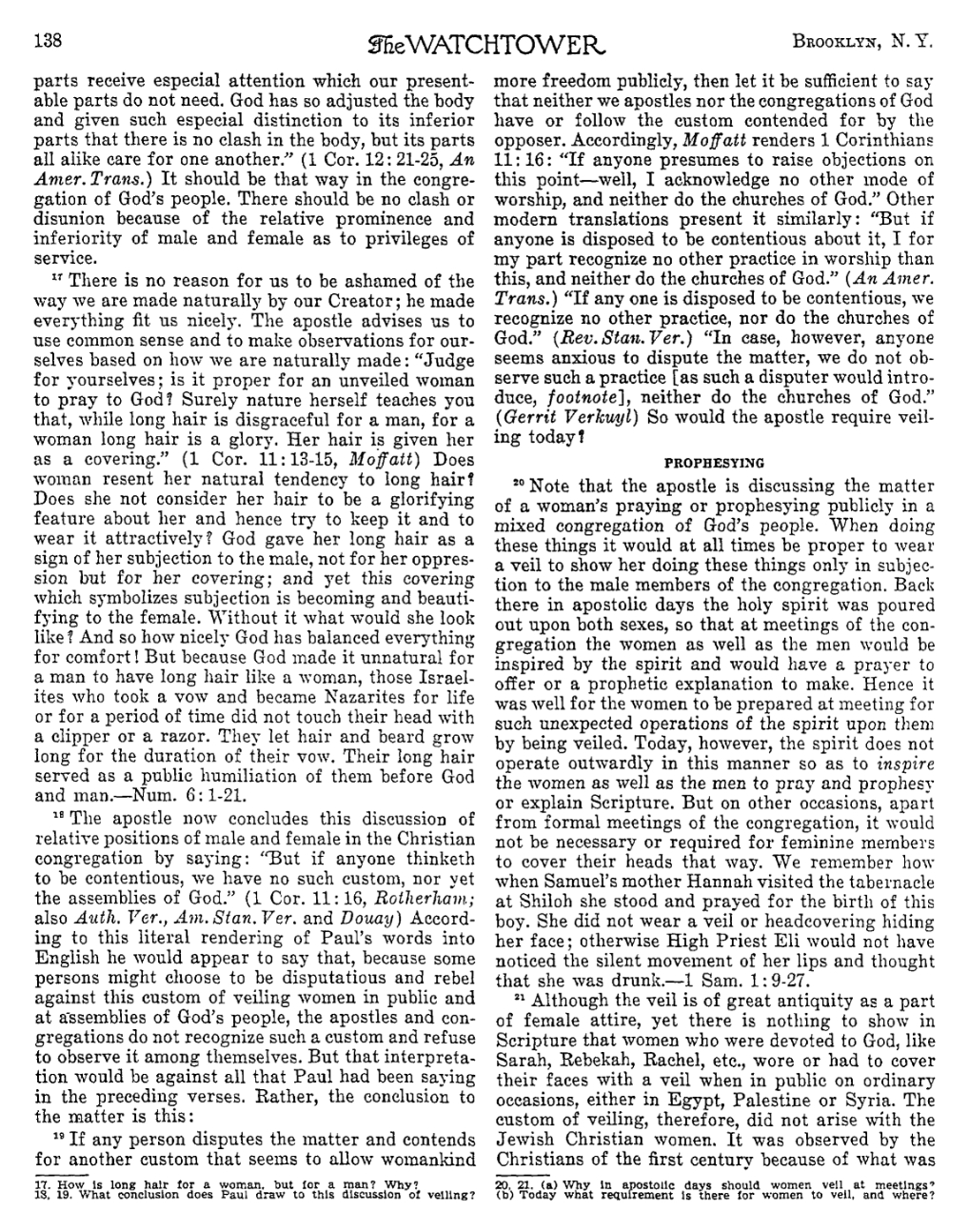This page has not been proofread
128
The WATCHTOWER
Brooklyn, N.Y.
parts receive especial attention which our presentable parts do not need. God has so adjusted the body and given such especial distinction to its inferior parts that there is no clash in the body, but its parts all alike care for one another." (1 Cor. 12: 21-25, An Amer. Trans.) It should be that way in the congregation of God's people. There should be no clash or disunion because of the relative prominence and inferiority of male and female as to privileges of service.
17 There is no reason for us to be ashamed of the way we are made naturally by our Creator; he made everything fit us nicely. The apostle advises us to use common sense and to make observations for ourselves based on how we are naturally made: "Judge for yourselves; is it proper for an unveiled woman to pray to God? Surely nature herself teaches you that, while long hair is disgraceful for a man, for a woman long hair is a glory. Her hair is given her as a covering." (1 Cor. 11: 13-15, Moffatt) Does woman resent her natural tendency to long hair? Does she not consider her hair to be a glorifying feature about her and hence try to keep it and to wear it attractively? God gave her long hair as a sign of her subjection to the male, not for her oppression but for her covering; and yet this covering
which symbolizes subjection is becoming and beautifying to the female. Without it what would she look like? And so how nicely God has balanced everything for comfort! But because God made it unnatural for a man to have long hair like a woman, those Israelites who took a vow and became Nazarites for life or for a period of time did not touch their head with a clipper or a razor. They let hair and beard grow long for the duration of their vow. Their long hair served as a public humiliation of them before God and man.-- Num. 6: 1-21.
18 The apostle now concludes this discussion of relative positions of male and female in the Christian congregation by saying: "But if anyone thinketh to be contentious, we have no such custom, nor yet
the assemblies of God." (1 Cor. 11: 16, Rotherham; also Auth. Ver., Am. Stan. Ver. and Douay) According to this literal rendering of Paul's words into English he would appear to say that, because some persons might choose to be disputatious and rebel against this custom of veiling women in public and at assemblies of God's people, the apostles and congregations do not recognize such a custom and refuse to observe it among themselves. But that interpretation would be against all that Paul had been saying in the preceding verses. Rather, the conclusion to the matter is this:
19 If any person disputes the matter and contends for another custom that seems to allow womankind
more freedom publicly, then let it be sufficient to say that neither we apostles nor the congregations of God have or follow the custom contended for by the opposer. Accordingly, Moffatt renders 1 Corinthians 11: 16: "If anyone presumes to raise objections on this point-well, I acknowledge no other mode of worship, and neither do the churches of God." Other modern translations present it similarly: "But if anyone is disposed to be contentious about it, I for my part recognize no other practice in worship than this, and neither do the churches of God." (An Amer. Trans.) "If anyone is disposed to be contentious, we recognize no other practice, nor do the churches of God." (Rev. Stan. Ver.) "In case, however, anyone seems anxious to dispute the matter, we do not observe such a practice [as such a disputer would introduce, footnote], neither do the churches of God." (Gerrit Verkuyl) So would the apostle require veiling today?
PROPHESYING
20 Note that the apostle is discussing the matter of a woman's praying or prophesying publicly in a mixed congregation of God's people. When doing these things it would at all times be proper to wear a veil to show her doing these things only in subjection to the male members of the congregation. Back there in apostolic days the holy spirit was poured out upon both sexes, so that at meetings of the congregation the women as well as the men would be inspired by the spirit and would have a prayer to
offer or a prophetic explanation to make. Hence it was well for the women to be prepared at meeting for such unexpected operations of the spirit upon them by being veiled. Today, however, the spirit does not operate outwardly in this manner so as to inspire the women as well as the men to pray and prophesy or explain Scripture. But on other occasions, apart from formal meetings of the congregation, it would not be necessary or required for feminine members to cover their heads that way. We remember how when Samuel's mother Hannah visited the tabernacle at Shiloh she stood and prayed for the birth of this boy. She did not wear a veil or headcovering hiding her face; otherwise High Priest Eli would not have noticed the silent movement of her lips and thought that she was drunk. -1 Sam. 1: 9·27.
21 Although the veil is of great antiquity as a part of female attire, yet there is nothing to show in Scripture that women who were devoted to God, like Sarah, Rebekah, Rachel, etc., wore or had to cover
their faces with a veil when in public on ordinary occasions, either in Egypt, Palestine or Syria. The custom of veiling, therefore, did not arise with the Jewish Christian women. It was observed by the Christians of the first century because of what was
